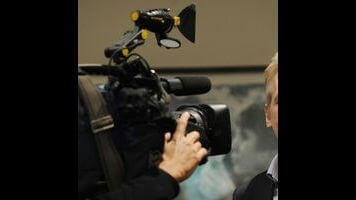Frontline: "The Interrupters"

The Interrupters was released to theaters last year. It made our list of the top films of 2011, and we're reprinting Scott Tobias' review of the original release, as it's making its television debut tonight on PBS' Frontline at 9 p.m. Eastern and Pacific, 8 p.m. Central and Mountain in most markets. Check local listings.
Unlike many other socially engaged documentaries, the films of Steve James (Hoop Dreams) are more descriptive than prescriptive, exposing deep, intractable problems that may not have solutions, in spite of the best efforts of those concerned. James’ heartbreaking 2002 documentary Stevie relayed his own challenges and shortcomings as a Big Brother to a violent, erratic young man in rural Illinois. Produced in collaboration with Alex Kotlowitz, a journalist who wrote a 2008 New York Times piece on the effort to curb violence in Chicago, James’ powerful new film The Interrupters offers the lessons of Stevie writ large, as local activists commit, with varied results, to halting a tragic epidemic. It’s a job fraught with volatility and peril, taken with the understanding that some cases may ultimately end in failure.
Filmed over the course of a year that saw more killings on the streets of Chicago than among American soldiers serving in Iraq and Afghanistan, The Interrupters embeds with CeaseFire, an organization devoted to violence prevention. Founded by Gary Slutkin, an epidemiologist who likens the violence to the spread of infectious diseases, CeaseFire employs mediators whose credibility often lies in the tragic lessons of their own criminal histories. James follows three of them: Ameena Matthews, the daughter of notorious gang leader Jeff Fort, who’s shown counseling a 19-year-old girl with immense reserves of anger; Cobe Williams, whose disarming charisma helps tame a young parolee who served an armed-robbery stint and a squatter who constantly threatens to use the pistol tucked in his jeans; and Eddie Bocanegra, a former Latino gang member trying to atone for a murder he committed at age 17.
The Interrupters was shot at a time when violence in Chicago became national news, spurred on by the case of Derrion Albert, a 16-year-old honor student whose death in a South Side mêlée was captured on videotape. Attorney General Eric Holder and Education Secretary Arne Duncan both swung by the city for press conferences, and there was talk of National Guardsmen being deployed in “war zones” like Englewood and Roseland. But after the media spotlight fades, CeaseFire remains present to do the tricky work of putting itself in the middle of conflicts, which takes enormous courage on several fronts simultaneously. CeaseFire members aren’t in the business of stopping criminal activity or serving as informants, which occasionally puts the group at odds with the police, and its mediators routinely throw themselves into dangerous situations where they stand between warring parties.
James’ camera is present for moments of extraordinary tension: A contrite ex-con apologizing to the family he terrorized in a barbershop robbery; a street fight that escalates with a butcher knife and a hunk of concrete; a pair of brothers so hostile that they come to blows whenever they see each other. Witnessing outreach workers intervening in these situations is inspiring enough, but their subtlety and nuance in neutralizing people of different backgrounds and temperaments is especially impressive. Given such a wealth of material, James has trouble wrangling it all: Different cuts have been screened at 164 minutes and 145 minutes, and the current 125-minute version feels rushed, with a uncharacteristically pat postscript. If there’s one lesson to be learned from violence interrupters, it’s that their work is never done.